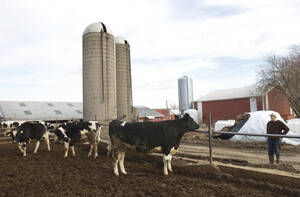The 2012 Farm Bill became a casualty of this election season’s often rancorous budget debate as the last congressional session before the November elections ended without its authorization. U.S. agricultural policy is revised every five years, but the current farm bill expired on Sept. 30 with no new law in place. The $500 billion 2012 package passed the Senate with bipartisan support in June, but the House version never made it to a floor debate.
“It’s a food and a farm bill really,” said James Ennis, executive director of Iowa’s National Catholic Rural Life Committee, pointing out that about 80 percent of its $100 billion annual cost will be spent on nutrition programs like the Supplemental Nutrition Assistance Program (commonly known as food stamps). “The major sticking point was SNAP,” said Ennis, explaining that instead of cutting direct payment programs to farmers, Republican House members were proposing deeper cuts in nutrition assistance. Since the global economic crisis began in 2008, spending on SNAP has more than doubled to $80 billion a year, driven by high unemployment, rising food prices and expanded eligibility under President Obama’s 2009 economic stimulus. Food stamps now help feed 46 million Americans, or one in seven people.
“Their complaint is that people are getting used to these handouts from the government and now is the time to get our [fiscal] house in order,” Ennis said. But House Republican leaders were reluctant to bring the bill to the floor, where a fight over food stamps seemed an unappealing prospect before the November elections, according to Ennis. He speculated that some Republican house members may have hoped, in tabling the farm bill in September, that November would return a stronger Republican House contingent to Washington with a mandate to seek deeper cuts in federal spending.
Anthony Granado, a policy advisor on agriculture for the U.S. Conference of Catholic Bishops, declined to comment on Congress’s inability to close the deal on the farm bill this year. He did say that the U.S.C.C.B. and its legislative allies, Catholic Charities U.S.A., Catholic Relief Services and the N.C.R.L.C., would “continue to support a farm bill that cares for the poor and vulnerable.
“That has been our consistent interest, and it will be the message we’re pushing after the election,” Granado said, referring to the lame duck session that will follow the Nov. 6 elections. If a new package is not authorized then or the existing farm bill is not extended, U.S. farmers and food stamp recipients, not outgoing members of Congress, face a nuclear option. According to a previous stipulation, failure to pass a farm bill in 2012 will mean a policy reversion not to the 2008 Farm Bill, but to its 1949 incarnation. It is no surprise that Ennis thinks that decades-old policy is “archaic and obsolete.”
“That would cause all kinds of havoc,” he said.
But Ennis hopes this Congress proves productive during its last session. He thinks if that is going to happen, Catholic citizens must urge their representatives to make passage of a new farm bill a priority. The current legislative limbo has already locked down international food assistance programs and an important federal conservation program that pays farmers to set aside highly erodible fields. “They’re going to go back to farming fence row to fence row right now,” Ennis said, “because [without reauthorization] there is no incentive for them to take fields out of production.” Farmers plan far ahead of planting, Ennis said. “They need to know what’s available to them now.”








